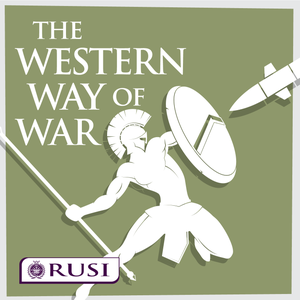
Western Way of War
The Royal United Services Institute
- 55 minutes 54 secondsSo What Did We Learn, if Anything?
WWoW groupie Emilie Cleret from France’s École de Guerre challenges podcast host Peter Roberts over his methodology, principles and the basic idea that a Western Way of War really exists. There is a final (really final – the very last) bonus episode for RUSI members on the RUSI website.
23 December 2021, 9:23 am - 29 minutes 56 secondsBen Wallace: Not Tinkering Around the Edges
UK Secretary of State for Defence Ben Wallace talks to Peter Roberts about spending trends, allies, terrorism, campaigning, budgets and reforming the military (and the strategic headquarters of defence). Do we know him any better after this chat? You be the judge.
16 December 2021, 1:05 pm - 29 minutes 17 secondsDr Matthew Harries: Matters of nuclear weapons
There is a lot going on with nuclear weapons at the moment - from UK and German announcements, changes in the way China is thinking about nuclear doctrine, and US recapitalisation (including some spoilers about what to expect from the US Nuclear Posture review due out in January 2022). Who better to discuss all this with than RUSI's own doyen of WMD, Dr Matthew Harries? He and Peter try to avoid theological questions and stick to the reality. Find out if they succeeded.
9 December 2021, 12:42 pm - 31 minutes 32 secondsJoann Robertson: Rethinking Logistics
From Sun Tzu to Admiral Hyman Rickover, great military leaders really understood logistics and supply. Yet by outsourcing so much to industrial partners, have Western militaries introduced disproportionate risk to their operations? By rethinking these variables, Joann Robertson talks to Peter Roberts about how logistics could become the elusive advantage that Western militaries have been seeking.
2 December 2021, 10:02 am - 31 minutes 10 secondsSam Cranny Evans: Chinese Ground Forces
Peter talks to the latest RUSI recruit and People’s Liberation Army researcher Sam Cranny Evans about the professionalisation and modernisation of the Chinese ground forces since 1980, their doctrine of strategic attrition and defeat-in-detail, the new Combined Armed Brigade structures, and whether Chinese electronic warfare is as good as that of the Russians.
25 November 2021, 10:23 am - 31 minutes 42 secondsNatia Seskuria: Russian Borderisation Tactics
When Russia invaded Georgia in 2008, Moscow annexed 20% of Georgia's sovereign land space using traditional military force. Over the subsequent 13 years, however, Georgia has been subject to constant political, economic and societal coercion as Moscow tries to steer Tbilisi into the Russian sphere of influence. The tradecraft used by Moscow might simply be an evolution of what we previously knew as 'active measures', but – as Georgian analyst Natia Seskuria tells Peter Roberts – it certainly feels new.
18 November 2021, 1:13 pm - 31 minutes 51 secondsAlessio Patalano: The Evolution of Warfare at Sea
Peter Roberts talks to Professor Alessio Patalano, doyen of the development of naval warfare and strategy at King’s College London. They discuss combat experience at sea, the value of corporate memory, the formation of alliances, naval diplomacy, economics and the fragility of life at sea.
11 November 2021, 11:07 am - 32 minutes 22 secondsKafia Omar: A Deadly Decade for Children
The experience of children in war is getting worse, from mental abuse to physical torture, kidnap, rape and being forcibly inducted into militaries. Peter Roberts talks to Kafia Omar from the charity War Child about what can be done so that states can live up to their legal and moral obligations to stamp out such practices.
4 November 2021, 2:31 pm - 32 minutes 33 secondsSarah Ashbridge: Are We Proud of the Contract Between the Military and Society?
Veterans, families, casualties, death and the repatriation of casualties’ remains feature as key themes in a discussion between conflict archaeologist Dr Sarah Ashbridge and Peter Roberts. The key question: is the reverse of the current implicit contract between service personnel and the nation – namely society’s obligation to people in uniform, both living and dead – something we should be proud of or slightly ashamed of?
21 October 2021, 12:18 pm - 26 minutes 46 secondsJustin Bronk: An Unhealthy Dependence on Air Power
Peter Roberts talks to RUSI Research Fellow for Airpower and Technology Justin Bronk about the realities of aircraft availability for contemporary operations, and the risk that Western air forces may ‘design themselves into irrelevance’ because of a flawed set of assumptions about force generation for peacetime duties that just don't work in combat.
14 October 2021, 1:23 pm - 36 minutes 34 secondsMalcolm Davis: Kill the Chicken to Scare the Monkey
In facing down China, Australia is having to make some audacious decisions. Australian defence expert Malcolm Davis from ASPI talks to Peter Roberts about how Australia has been dealing with economic and political coercion from China’s Communist Party, and what this has meant for military capabilities, alliances and postures as Australia has become a hemispheric actor of significance.
7 October 2021, 9:53 am - More Episodes? Get the App
Your feedback is valuable to us. Should you encounter any bugs, glitches, lack of functionality or other problems, please email us on [email protected] or join Moon.FM Telegram Group where you can talk directly to the dev team who are happy to answer any queries.